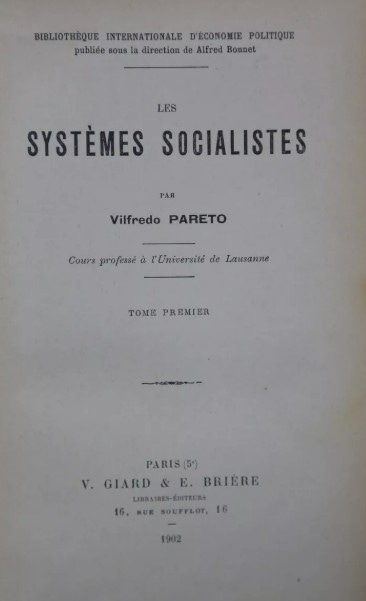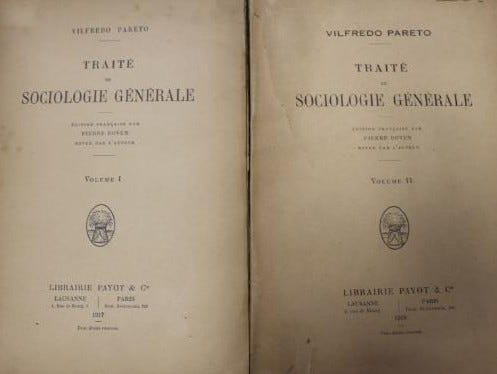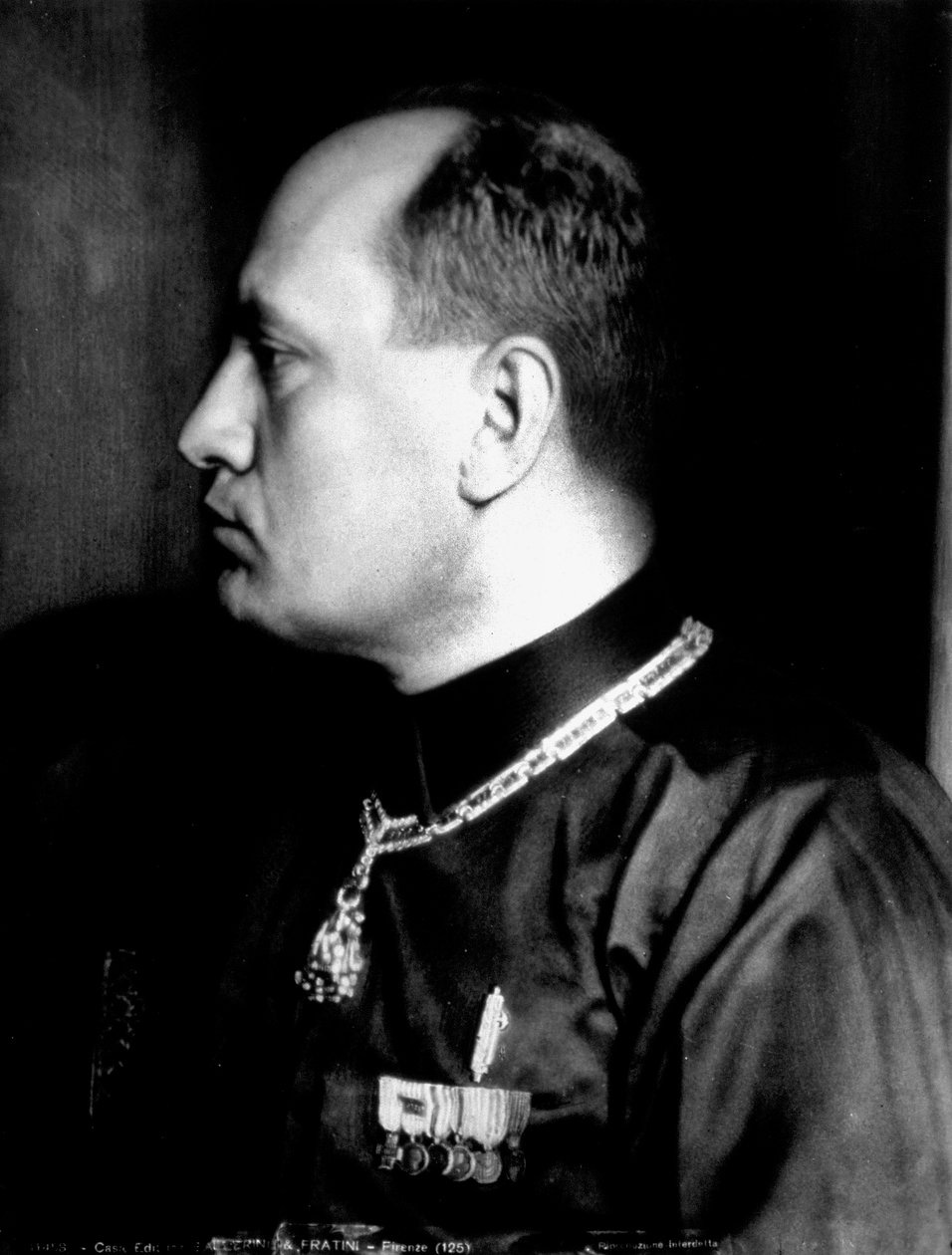Italy’s contributions to political and social thought are unparalleled, spanning centuries and shaping the course of Western civilization. Names like Dante Alighieri, Niccolò Machiavelli, and Giambattista Vico resonate through the annals of Western civilization, and this brilliance continued undiminished into the modern age. The twentieth century saw Italians continue to shape political theory with penetrating insight. Gaetano Mosca unveiled the mechanics of oligarchic rule, Roberto Michels dissected the inner dynamics of political parties, Corrado Gini explored sociobiological laws, and Scipio Sighele delved into the psychology of crime and crowds. Among this distinguished pantheon stands Vilfredo Pareto—whose influence is so enduring that it is said, “the history of sociology cannot be written without mentioning Pareto.”
His legacy transcends the cloistered halls of academia. Pareto stands as a central figure in one of Europe's most significant yet suppressed and relatively unknown intellectual traditions, a current of thought that defies the orthodoxies of rationalism, liberalism, and egalitarianism. Figures such as Hippolyte Taine, Jacob Burckhardt, Juan Donoso Cortés, Friedrich Nietzsche, and Oswald Spengler exemplified a similar rejection of the Enlightenment’s elevation of abstract dogma at the expense of timeless truths rooted in history and spirit. Each, in his own way, challenged the ideological currents that have shaped and hastened the modern world's decline.
Pareto is widely known for the Pareto Principle, or the 80/20 rule, which holds that a small number of causes often account for a large share of effects—such as 20% of customers generating 80% of business profits. Pareto initially observed this pattern in wealth distribution, noting that 80% of a nation's wealth was typically controlled by 20% of the population. This principle has since been applied across various fields, illustrating how a productive minority often drives the majority of outcomes, while the remaining 80% contributes far less to overall results. However, this principle is merely a fragment of his more expansive intellectual vision. Pareto sought to expose the underlying patterns of human behavior, social balance, and the relentless competition for power. His enduring relevance lies in his ability to expose these hidden dynamics, securing his place as a towering figure in a tradition of thought dismissed by modern orthodoxy.
A Life:
Vilfredo Federico Damaso Pareto was born in Paris in 1848 to the Marquis Raffaele Pareto, an Italian exile from Genoa, and Marie Mattenier, a Frenchwoman. His father, a hydrological engineer of comfortable means, ensured that his son was raised in a middle-class environment with access to education befitting his lineage. Pareto completed his studies in both France and Italy, earning a degree in engineering from the Istituto Politecnico of Turin, where he graduated with distinction. He later applied his skills as a civil engineer, working both in Italy's state-run railways and in private industry.
In 1889, Pareto married Dina Bakunin, a vivacious woman whose passion for public life stood at odds with his preference for solitude and introspection. The marriage ended after twelve years, leaving Pareto disillusioned with the pursuit of love and personal relationships in general until he met Jane Régis. Their union provided him with the introspective stability he valued, and they remained devoted to one another for the rest of his life.
Pareto's intellectual engagement with politics intensified during his early career. He became a fierce advocate of free-market economics and trade liberalization, which he deemed crucial for Italy's prosperity. His speeches, often polemical and uncompromising, drew ire from the political establishment of the time, leading to police interventions and even physical threats from hired agitators. Despite his unwavering conviction, his ideas found little traction, prompting him to withdraw from public political life. In 1893, he accepted a position as Professor of Political Economy at the University of Lausanne in Switzerland, where his reputation flourished. Both critics and supporters alike came to refer to him as “the Karl Marx of the Bourgeoisie” and, at times, “the Karl Marx of Fascism.” His Manual of Political Economy and his incisive critique of Marxism, The Socialist Systems, remain foundational works in economic theory.
Pareto’s venture into sociology came later in life but was no less impactful. His Treatise on General Sociology and works such as The Rise and Fall of the Elites established him as one of the foremost theorists in the field. His analytical insights into power structures and human behavior elevated his status to that of a scholar of international renown.
Although Pareto inherited the title of Marquis after his father’s passing, he rejected its use, considering unearned honors devoid of value. In contrast, he embraced the title of “Professor,” as he believed it reflected his earned accomplishments through rigorous study and contribution to knowledge.
Like all men of great ability, Pareto’s intellectual dominance often alienated those around him. His confidence bordered on arrogance, and his sharp wit frequently led to conflicts with colleagues and opponents. He was resolute in his beliefs, stubborn in debate, and sometimes cruelly dismissive of those he found intellectually lacking. Yet, beneath his combative exterior was a man of profound empathy for those cast aside by society. Pareto frequently championed the downtrodden, denouncing corruption and providing shelter and support to political exiles. As sociologist Charles Powers noted, Pareto exhibited a paradoxical character: deeply conservative in personal values, yet passionately devoted to individual liberty and opportunity.
Pareto’s sense of honor extended beyond the intellectual realm. A skilled swordsman and marksman, he neither tolerated threats nor allowed insults against his honor to go unchallenged. On more than one occasion, he sent would-be attackers fleeing, refusing to bend to cowardice or coercion.
In his later years, Pareto’s health declined due to heart disease. Despite his suffering, he continued to write and correspond until his death in Switzerland on August 19, 1923. His life, defined by an unrelenting quest for truth and a steadfast commitment to principle, left a profound impact on both political and social thought.
Against Liberalism & Marxism:
Pareto was a relentless adversary of Marxism and liberal egalitarianism. In 1902, he published The Socialist Systems, a devastating critique of these intertwined doctrines. This work, regrettably unavailable in full to the English-speaking world, dismantles the prevailing assumptions of what has now become the dominant worldview. In its pages, Pareto warned of the internal collapse that awaits any ruling elite corrupted by sentimentality. He observed, “A sign of aristocratic decadence is the intrusion of humanitarian sentimentality. The strong man strikes only when necessary; nothing stops him. Trajan was strong, not violent. Caligula was violent, not strong.” He made a clear distinction between violence and force, pointing out that degenerating elites often resort to senseless brutality after losing the inner strength to maintain their rule through disciplined force.
For Pareto, the fate of civilizations rested on the will to defend and assert themselves in an unforgiving world. He wrote that societies incapable of shedding blood in their own defense would inevitably fall prey to those less restrained. History, in his eyes, offered no illusions of progress driven by compassion. The globe itself bore the scars of conquests won by the sword, with no land untouched by the harsh law of power. If Europeans had subjugated Africa, it was only because they possessed superior strength. Had the roles been reversed, it would have been Africa dividing Europe.
Pareto's reflections bear a resemblance to Spengler’s warnings of civilizational decay. He saw humanitarianism not as a virtue but as a symptom of decline. He recounted how the French aristocracy, drunk on its self-satisfied “sensibility” in the years leading to the Revolution, found itself shattered by the guillotine. The same fate, Pareto contended, awaited any ruling class that abdicated its role as a guardian of its civilization.
The heart of Pareto’s critique extended beyond aristocratic decline to the illusions propagated by Marxism. While he acknowledged that class struggle is a recurring theme throughout history, he rejected the simplistic dualism of proletariat versus capitalist. Instead, he argued that history is marked by an endless competition between myriad groups, each vying for power. In some societies, this division might manifest through class; in others, it might be based on race, religion, or nationality. Pareto noted, for example, that the ethnic conflict between Czechs and Germans in early 20th-century Bohemia was far more intense than any labor dispute in England.
In Pareto’s eyes, Marxism was not a revolutionary challenge to power but an attempt to replace one elite with another. The Marxist vision of a utopian future—a classless paradise—was, to him, a dangerous mirage. He observed how each new generation of revolutionaries denounced the failures of prior movements, proclaiming their own to be the true path to salvation. Yet the promised golden age remained forever beyond reach, like the millenarian dreams of bygone eras.
This analysis of socialism as a recurring cycle of elite manipulation struck deep, so much so that historian H. Stuart Hughes reported it gave Lenin “many a sleepless night.” Pareto saw the future clearly: the slogans of equality and emancipation were but masks concealing the eternal struggle for dominion. Human nature, he believed, remained unchanged—governed not by reason, but by instinct and sentiment, forever ensnared in the battle for power and survival.
The Residues of Power and the Sentiments of Civilization:
Pareto’s most profound and provocative theory asserts that human behavior is driven not by reason but by deep-rooted, instinctual drives. In The Socialist Systems and further elaborated in his Treatise on General Sociology, he dissected these impulses, categorizing them into six fundamental groups he termed residues. These residues, he asserted, are universal and immutable, for man’s political nature is not perfectible but remains a constant across the ages.
The first, Class I, represents the “instinct for combinations”—an impulse toward innovation, experimentation, and adventure. This residue is the hallmark of the progressive mind, restless in its quest for novelty. Opposed to this is Class II, the “preservation of aggregates,” embodying the conservative drive to safeguard institutions such as family, religion, and the nation. These impulses anchor human beings to tradition, permanence, and stability.
Pareto further identified Class III as the expression of core values through ritual and symbolism. Patriotic ceremonies, religious sacraments, and even military parades exemplify this residue, underscoring humanity's need for symbolic representation of their inner beliefs. Class IV pertains to social cohesion through discipline and hierarchy. It manifests in acts of self-sacrifice for the collective, reinforcing the structure of a well-ordered society. Class V involves the maintenance of integrity, both personal and social—laws and norms safeguarding property and reputation arise from this residue. Lastly, Class VI addresses the sexual instinct, which colors human perceptions and behavior in the social sphere.
In his analysis of power, Pareto gives particular weight to the interplay between Class I and Class II—the struggle between innovation and consolidation. His disciple, James Burnham, traced this duality to Machiavelli’s division of men into foxes and lions. Foxes, corresponding to Class I, are cunning, opportunistic, and adaptable. They thrive in deception, manipulation, and intellectual pursuits. Lions, the embodiment of Class II, are resolute, disciplined, and loyal. They defend tradition and order, often through direct force.
Pareto demonstrated this dynamic through historical examples. Kaiser Wilhelm I and Otto von Bismarck exemplified the ideal partnership of lion and fox. Wilhelm’s conservatism and sense of duty complemented Bismarck’s strategic cunning, enabling Prussia to dominate European affairs. Conversely, Pareto criticized the reign of Napoleon III, whose administration was overrun by opportunistic financiers—foxes in excess—leading to France’s catastrophic defeat in 1870.
To rationalize their emotion-driven actions, Pareto observed, people craft ostensibly logical justifications—what he called derivations. These take various forms, including dogmatic assertions, appeals to tradition, popular belief, and rhetorical devices. Such derivations serve as intellectual facades for deeper, instinctual motives. In exposing this reality, Pareto delivered a direct challenge to the rationalist pretensions of liberal ideology, revealing the primal forces at the heart of political life.
For Pareto, these residues and derivations maintain the equilibrium of society. Imbalances, however, arise when the ruling class loses touch with the natural order. In Italy and France, he lamented the dominance of foxes, whose obsession with negotiation, profit, and intellectual abstraction had weakened the state’s capacity for decisive action. Societies under such leadership eschew force in favor of endless compromise, leaving them vulnerable to collapse.
Pareto’s critique of misguided humanitarianism extended to criminal justice, where he saw leniency toward offenders as a sign of societal decay. He derided modern efforts to excuse criminal behavior by invoking heredity, social circumstances, or collective guilt. He challenged the notion that innocent individuals should bear the burden of “society’s” alleged failings, arguing instead for the necessity of strict retribution. To Pareto, such leniency signaled the decline of a civilization that had forsaken its instinct for self-preservation.
The Dynamics of Power: Elites, Equilibrium, and Political Fate:
In foreign affairs, Pareto observed that societies dominated by foxes prioritize commerce and diplomacy, often to their detriment. Guided by profit and loss calculations, these leaders rely on negotiation, assuming that reason and economic incentives can resolve all conflicts. This mindset leads to ruin when confronting adversaries who balance cunning with force. A nation ruled by foxes may achieve temporary security through deception and appeasement, but in Pareto’s words, “The fox may, by his cunning, escape for a certain length of time, but the day may come when the lion will reach him with a well-aimed cuff, and that will be the end of the argument.”
Pareto’s most renowned contribution to political sociology is his theory of the “circulation of elites.” He argued that social equilibrium relies on a cyclical shift between speculators—innovators prone to instability—and rentiers, who emphasize order and continuity. Speculators, characterized by Class I residues, are innovators and risk-takers—quick to adapt but prone to corruption and instability. Rentiers, embodying Class II residues, are conservatives who value stability, tradition, and order. Over time, speculator-dominated regimes tend toward decadence and scandal, prompting a return of rentier forces to restore balance. Pareto argued that this cyclical shift between dominant elite types is a natural mechanism for maintaining stability in all enduring societies.
A crucial element of elite stability, Pareto noted, is the capacity to integrate exceptional individuals from the lower strata. This selective elevation of talent and ambition serves a dual purpose: replenishing the elite with vitality while depriving the masses of potential revolutionary leaders. A dominant group survives only if it remains meritocratic and unyielding in its defense of privilege. In contrast, elites that succumb to humanitarian sentimentality and abandon the use of force weaken themselves, leaving the path open for their overthrow. Pareto summed up this decay with grim finality: “History is a graveyard of aristocracies.”
Pareto’s contempt for Italy’s democratic government, mired in corruption and controlled by self-serving speculators, led him to support the Fascist seizure of power in 1922. Reportedly, from his sickbed, he exclaimed, “I told you so!”—having long predicted that a disciplined and forceful elite would rise to displace the ineffectual political class crippling the nation. Mussolini, a former student of Pareto's at Lausanne, later acknowledged how Pareto’s teachings had influenced his worldview.
Mussolini and his advisors drew heavily from Pareto’s theories of elite circulation and societal equilibrium to shape early Fascist policy. They saw liberal governance as a system undermined by opportunists and rent-seekers and applied Pareto’s ideas to dismantle these institutions, replacing them with a leadership grounded in discipline and merit. Pareto’s insights on the cyclical nature of power transitions underscored the need for continual renewal of the ruling class to maintain national stability. Guided by this framework, the regime prioritized industrial advancement, social hierarchy, and the elevation of capable leaders from various social backgrounds. These reforms were intended to secure Italy’s long-term strength and resilience in an increasingly competitive and volatile world.
Despite his alignment with certain Fascist policies, Pareto never joined the party nor fully embraced its doctrines. He remained a critic of excessive state control and curbs on intellectual freedom. Pareto’s skepticism toward all regimes reflected his broader distrust of rigid ideological systems. Mussolini himself echoed this pragmatism, asserting that “every system is a mistake and every theory a prison.” Fascism, in its early conception, sought to embody this fluidity, guided by the principle of relentless seeking rather than static dogma.
Pareto’s intellectual legacy transcended the collapse of the Fascist regime. Despite the devastation of the Second World War and the Allied occupation of Italy, his works continue to inspire debate among serious thinkers. His penetrating analysis of human behavior, elite dynamics, and social equilibrium remains as relevant as ever, a testament to the lasting influence of his thought.








